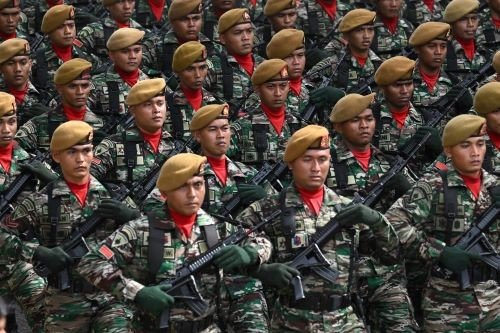News
Military CEOs at SOEs raise cronyism concerns
Tenggara Strategics May 16, 2025 Up in arms: Army personnel march during celebrations to mark the 78th anniversary of the Indonesian Military (TNI) in Banda Aceh, Aceh, on Oct. 5, 2023. (AFP/Chaideer Mahyuddin)
Up in arms: Army personnel march during celebrations to mark the 78th anniversary of the Indonesian Military (TNI) in Banda Aceh, Aceh, on Oct. 5, 2023. (AFP/Chaideer Mahyuddin)
Since taking office in October, President Prabowo Subianto has moved quickly to install key allies, many with military backgrounds, into top posts at state-owned enterprises (SOEs). Their appointments span a wide range of sectors from aviation and logistics to mining, prompting concerns over growing cronyism and the erosion of meritocratic principles in corporate governance of SOEs.
Prabowo has shown a clear preference for loyalists with military backgrounds or graduates of SMA Taruna Nusantara (Tarnus) senior high school, a military-style elite boarding school in Central Java that he has long supported. Their appointed roles include chief executive at oil and gas holding company Pertamina, flag carrier Garuda Indonesia, the State Logistics Agency (Bulog) and tin miner PT Timah.
Among the most prominent appointees is former Air Force pilot Wamildan Tsani, who was named CEO of Garuda Indonesia in 2024. A Tarnus graduate, Walmidan’s selection was part of efforts to stabilize the financially troubled national airline. Despite his early exit from military service, his background in aviation was seen as a possible asset, though questions remain about his business acumen.
Walmidan joins a growing list of SOE executives with ties to Tarnus, including Simon Aloysius Mantiri, another alumnus who now leads Pertamina. Both Walmidan and Simon are in their 40s, and their relative youth and limited business experience have prompted scrutiny from analysts, who question whether their appointments reflect their capabilities or political connections.
This February, the government attracted further scrutiny with the appointment of Maj. Gen. Novi Helmy Prasetya as Bulog CEO, which followed his recent promotion as commander general of the Indonesian Military Academy. As an active duty officer with no commercial experience, Novi’s selection appeared to aim at reinforcing Prabowo’s food security agenda amid rising commodity pressures, particularly regarding rice absorption during the harvest season before Idul Fitri.
The blurred line between military service and civilian administration, especially at a strategic institution like Bulog, has fueled widespread concern. This was particularly evident around the time of Novi’s appointment, as the government was pursuing revisions to the Military Law that would further entrench military influence in civilian affairs.
Most recently, the appointment of Col. (ret) Restu Widiyantoro as CEO of Timah has again spotlighted this pattern of appointees with military backgrounds. Restu’s lack of business credentials has deepened public concerns, particularly in view of the appointment of Gerindra Party politician Andi Seto Gadhista Asapa as Timah’s human resources director and the presence of politically connected figures on its board of commissioners, such as Lt. Gen. (ret) Agus Rohman, an aide to former president Susilo Bambang Yudhoyono, and Yuslih Ihza Mahendra, brother to senior law minister Yusril Ihza Mahendra.
Timah has been embroiled in a major corruption case pertaining to illegal mining in its concession areas that incurred potential state losses of an estimated Rp 271 trillion (US$17 billion). Despite the scandal, the company posted a surprising turnaround from a loss of Rp 449 billion in 2023 with a net profit of Rp 1.18 trillion last year, driven largely by a 49 percent increase in tin revenue.
As for public skepticism over military officers in civilian roles, a 2014 study by Efraim Benmelech and Carola Frydman on United States firms found that those led by military veterans tended to adopt more conservative financial strategies, were less prone to fraud and performed better during downturns. Such findings could, in theory, justify the appointments of military figures at SOEs navigating financial or industry turbulence.
Nonetheless, the core issue remains: The pattern of appointing individuals with military backgrounds and without corporate leadership experience, especially when coupled with political or personal ties to the President, risks undermining the performance and credibility of SOEs. As the country’s public institutions face mounting calls for reform and transparency, the fusion of military culture, political loyalty and public enterprise management warrants deeper scrutiny.

